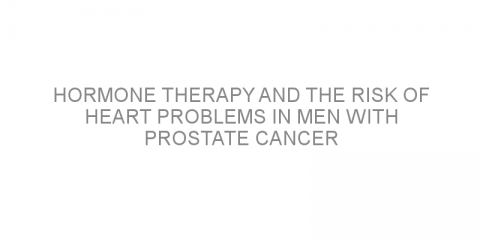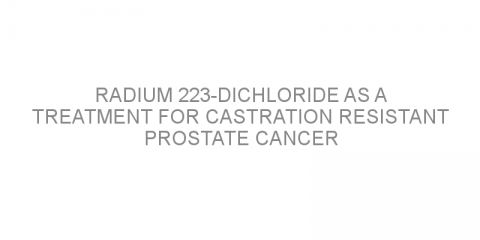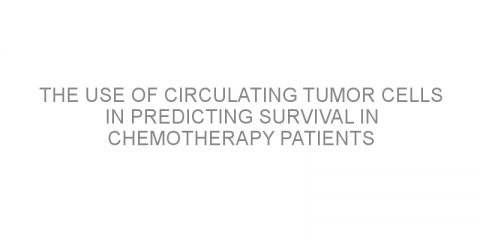In a nutshell This study aimed to determine whether androgen deprivation therapy (ADT) is associated with an increased risk of depression for patients with prostate cancer. It found that there was an increased risk of depression. Some background A main treatment option for prostate cancer is androgen deprivation therapy (ADT). This blocks...
Read MoreOngoing treatment(s)-Hormonal therapy Posts on Medivizor
Restarting hormone therapy leads to increased progression-free survival
In a nutshell This study examined the effect that restarting hormone treatment, as compared to stopping it, had on progression-free survival. It found that restarting treatment led to increased progression-free survival. Some background Breast cancer is classified into different subtypes depending on the prescence or absence of certain...
Read MoreThe effect of exercise on fatigue in men receiving hormone therapy for prostate cancer
In a nutshell The authors aimed to determine the long-term effects of different exercises on fatigue in men with prostate cancer who are receiving hormone therapy. The authors concluded that different exercises had different but comparable effects on reducing fatigue during hormone therapy. Some background Hormone therapy is a common treatment...
Read MoreHormone therapy and its impact on cognitive performance
In a nutshell The authors aimed to determine the changes in cognitive performance (CP) after 6 months of hormone therapy with luteinizing hormone-releasing hormone (LHRH) analogues. The authors concluded that CP in men with prostate cancer does not appear to be affected following 6 months of LHRH treatment. Some background Androgen...
Read MoreIs abemaciclib combined with fulvestrant effective in women with HR positive advanced breast cancer?
In a nutshell This study aimed to compare the effectiveness of the combination of fulvestrant (Faslodex) and abemaciclib to fulvestrant alone in patients with advanced breast cancer. This study concluded that the combination of fulvestrant and abemaciclib had improved outcomes for patients when compared to fulvestrant alone. Some background...
Read MoreLocal therapy and improved survival in advanced prostate cancer
In a nutshell The authors aimed to compare outcomes after local therapy versus no local therapy in men with advanced prostate cancer (cancer that has spread outside the prostate gland). The authors concluded that local therapy resulted in better outcomes when compared to no local therapy. They also concluded that in patients who received local...
Read MoreWhat are the side effects of non-hormonal drugs for hot flashes?
In a nutshell This study aimed to investigate the frequency and severity of the adverse events associated with non-hormonal drugs (NHD) used to treat hot flashes in breast cancer survivor patients. This study concluded that the use of high-dose NHD led to increased rates of adverse events when compared to patients not using NHD. Some...
Read MoreHormone therapy and the risk of heart problems in men with prostate cancer
In a nutshell The authors aimed to review the different types of hormone therapy and their effect on cardiovascular morbidity and death rates in men with prostate cancer. The authors concluded that it was difficult to determine which type of hormone therapy affected the risk for cardiovascular morbidity and that further detailed research was...
Read MoreRadium 223-dichloride as a treatment for castration resistant prostate cancer
In a nutshell This study investigated how effective and safe radium 223 dichloride treatment was in patients with castration resistant prostate cancer (CRPC). It was concluded that radium 223 dichloride increased overall survival, reduced symptomatic skeletal events risk and was safe. Some background Treatment to decrease the male hormones,...
Read MoreThe use of circulating tumor cells in predicting survival in chemotherapy patients
In a nutshell The aim of this study was to investigate if circulating tumor cells (CTC) levels in the blood could be used to determine the outcome for metastatic castration resistant prostate cancer patients. This study concluded that CTC levels could be used to predict survival in these patients. Some background Treatment for metastatic...
Read MoreIncidence of ovarian function recovery in women over 40 with chemotherapy induced amenorrhea
In a nutshell This study investigated ovarian function recovery (OFR) after chemotherapy-induced amenorrhea (absence of menstruation) in women aged 40-49 after 2 years of aromatase inhibitor (AI) therapy. The study concluded that a large number of women with chemotherapy-induced amenorrhea recover ovarian function during AI therapy. Some...
Read MoreComparing outcomes of radiation therapy and observation in patients over 80
In a nutshell This study examined different treatment options for elderly men with localized prostate cancer. Researchers reported that radiation therapy with or without hormone therapy was associated with a significant survival benefit when compared to observation alone. Some background Localized prostate cancer refers to cancer that is confined...
Read More










